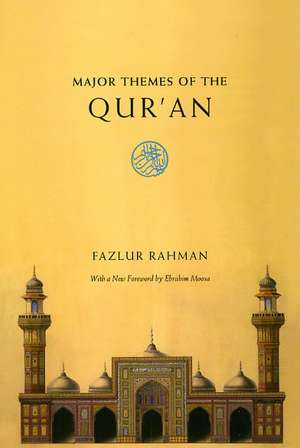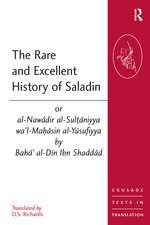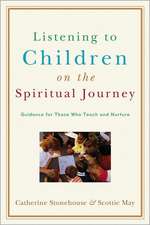Major Themes of the Qur'an: Second Edition
Autor Fazlur Rahmanen Limba Engleză Paperback – 2 iul 2009
Major Themes of the Qur’an is Fazlur Rahman’s introduction to one of the richest texts in the history of religious thought. In this classic work, Rahman unravels the Qur’an’s complexities on themes such as God, society, revelation, and prophecy with the deep attachment of a Muslim educated in Islamic schools and the clarity of a scholar who taught for decades in the West.
“Generations of scholars have profited from [Rahman’s] pioneering scholarly work by taking the questions he raised and the directions he outlined to new destinations.”--Ebrahim Moosa, from his new foreword
“The religious future of Islam and the future of interfaith relationship . . . will be livelier and saner for the sort of Quranic centrality which Major Themes of the Qur’an exemplifies and serves.”--Kenneth Cragg, Middle East Journal
“There shines through [a] rare combination of balanced scholarly judgment and profound personal commitment. . . . [Rahman is] eager to open up the mysteries of the Qur’an to a shrinking world sorely in need of both moral regeneration and better mutual understanding.”--Patrick D. Gaffney, Journal of Religion
“I can’t think of any book more important, still, than Major Themes of the Qur’an.”--Michael Sells, author of Approaching the Qur’an
“Generations of scholars have profited from [Rahman’s] pioneering scholarly work by taking the questions he raised and the directions he outlined to new destinations.”--Ebrahim Moosa, from his new foreword
“The religious future of Islam and the future of interfaith relationship . . . will be livelier and saner for the sort of Quranic centrality which Major Themes of the Qur’an exemplifies and serves.”--Kenneth Cragg, Middle East Journal
“There shines through [a] rare combination of balanced scholarly judgment and profound personal commitment. . . . [Rahman is] eager to open up the mysteries of the Qur’an to a shrinking world sorely in need of both moral regeneration and better mutual understanding.”--Patrick D. Gaffney, Journal of Religion
“I can’t think of any book more important, still, than Major Themes of the Qur’an.”--Michael Sells, author of Approaching the Qur’an
Preț: 217.38 lei
Nou
Puncte Express: 326
Preț estimativ în valută:
41.60€ • 45.32$ • 35.05£
41.60€ • 45.32$ • 35.05£
Carte tipărită la comandă
Livrare economică 23 aprilie-07 mai
Preluare comenzi: 021 569.72.76
Specificații
ISBN-13: 9780226702865
ISBN-10: 0226702863
Pagini: 208
Dimensiuni: 140 x 216 x 28 mm
Greutate: 0.25 kg
Ediția:2
Editura: University of Chicago Press
Colecția University of Chicago Press
ISBN-10: 0226702863
Pagini: 208
Dimensiuni: 140 x 216 x 28 mm
Greutate: 0.25 kg
Ediția:2
Editura: University of Chicago Press
Colecția University of Chicago Press
Notă biografică
Fazlur Rahman (1919–88) was Harold H. Swift Distinguished Service Professor of Islamic Thought at the University of Chicago. He was the author of ten books, including Islam and Modernity and Islam, also published by the University of Chicago Press.
Cuprins
Acknowledgments
Foreword by Ebrahim Moosa
Introduction
Chapter One
God
Chapter Two
Man as Individua
Chapter Three
Man in Society
Chapter Four
Nature
Chapter Five
Prophethood and Revelation
Chapter Six
Eschatology
Chapter Seven
Satan and Evil
Chapter Eight
Emergence of the Muslim Community
Appendix I
The Religious Situation of the Muslim Community in Mecca
Appendix II
The People of the Book and Diversity of Religions
Index
Recenzii
"Those who have been disappointed in what must seem the narrow defensiveness of so many Muslim writers attempting to present the Qur'an to outsiders will find Rahman refreshingly different. He is a mature thinker, at once well informed and basically realistic about the reigning myths of modern secularist society.He is also a clear writer capable of disarming simplicity and tightly reasoned, technically detailed argument."
"Here is a painstaking and positive effort to think through the Qur'an beyond the verse by verse, tediously grammatical, scrutiny which many have employed in past centuries. . . . The religious future of Islam and the future of interfaith relationship . . . will be livelier and saner of the sort of Quranic centrality which [this book] exemplifies and serves."















